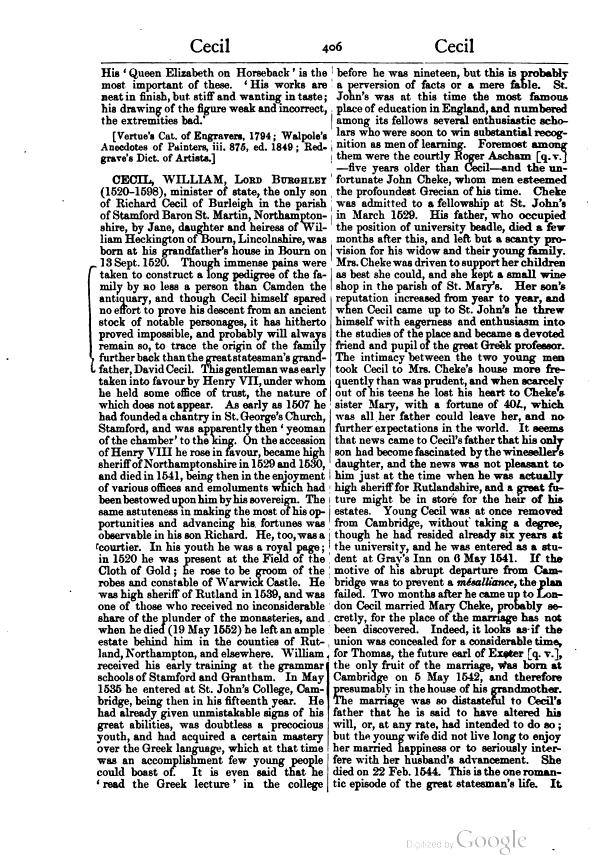His ‘Queen Elizabeth on Horseback’ is the most important of these. ‘His works are neat in finish, but stiff and wanting in taste; his drawing of the figure weak and incorrect, the extremities bad.’
[Vertue's Cat. of Engravers, 1794; Walpole's Anecdotes of Painters, iii. 875, ed. 1849; Redgrave's Dict. of Artists.]
CECIL, WILLIAM, Lord Burghley (1520–1598), minister of state, the only son of Richard Cecil of Burleigh in the parish of Stamford Baron St. Martin, Northamptonshire, by Jane, daughter and heiress of William Heckington of Bourn, Lincolnshire, was born at his grandfather's house in Bourn on 13 Sept. 1520. Though immense pains were taken to construct a long pedigree of the family by no less a person than Camden the antiquary, and though Cecil himself spared no effort to prove his descent from an ancient stock of notable personages, it has hitherto proved impossible, and probably will always remain so, to trace the origin of the family further back than the great statesman's grandfather, David Cecil. This gentleman was early taken into favour by Henry VII, under whom he held some office of trust, the nature of which does not appear. As early as 1507 he had founded a chantry in St. George's Church, Stamford, and was apparently then ‘yeoman of the chamber’ to the king. On the accession of Henry VIII he rose in favour, became high sheriff of Northamptonshire in 1529 and 1530, and died in 1541, being then in the enjoyment of various offices and emoluments which had been bestowed upon him by his sovereign. The same astuteness in making the most of his opportunities and advancing his fortunes was observable in his son Richard. He, too, was a courtier. In his youth he was a royal page; in 1520 he was present at the Field of the Cloth of Gold; he rose to be groom of the robes and constable of Warwick Castle. He was high sheriff of Rutland in 1539, and was one of those who received no inconsiderable share of the plunder of the monasteries, and when he died (19 May 1552) he left an ample estate behind him in the counties of Rutland, Northampton, and elsewhere. William received his early training at the grammar schools of Stamford and Grantham. In May 1535 he entered at St. John's College, Cambridge, being then in his fifteenth year. He had already given unmistakable signs of his great abilities, was doubtless a precocious youth, and had acquired a certain mastery over the Greek language, which at that time was an accomplishment few young people could boast of. It is even said that he ‘read the Greek lecture’ in the college before he was nineteen, but this is probably a perversion of facts or a mere fable. St. John's was at this time the most famous place of education in England, and numbered among its fellows several enthusiastic scholars who were soon to win substantial recognition as men of learning. Foremost among them were the courtly Roger Ascham [q. v.] —five years older than Cecil—and the unfortunate John Cheke, whom men esteemed the profoundest Grecian of his time. Cheke was admitted to a fellowship at St. John's in March 1529. His father, who occupied the position of university beadle, died a few months after this, and left but a scanty provision for his widow and their young family. Mrs. Cheke was driven to support her children as best she could, and she kept a small wine shop in the parish of St. Mary's. Her son's reputation increased from year to year, and when Cecil came up to St. John's he threw himself with eagerness and enthusiasm into the studies of the place and became a devoted friend and pupil of the great Greek professor. The intimacy between the two young men took Cecil to Mrs. Cheke's house more frequently than was prudent, and when scarcely out of his teens he lost his heart to Cheke's sister Mary, with a fortune of 40l., which was all her father could leave her, and no further expectations in the world. It seems that news came to Cecil's father that his only son had become fascinated by the wineseller's daughter, and the news was not pleasant to him just at the time when he was actually high sheriff for Rutlandshire, and a great future might be in store for the heir of his estates. Young Cecil was at once removed from Cambridge, without taking a degree, though he had resided already six years at the university, and he was entered as a student at Gray's Inn on 6 May 1541. If the motive of his abrupt departure from Cambridge was to prevent a mésalliance, the plan failed. Two months after he came up to London Cecil married Mary Cheke, probably secretly, for the place of the marriage has not been discovered. Indeed, it looks as if the union was concealed for a considerable time, for Thomas, the future earl of Exeter [q. v.], the only fruit of the marriage, was born at Cambridge on 5 May 1542, and therefore presumably in the house of his grandmother. The marriage was so distasteful to Cecil's father that he is said to have altered his will, or, at any rate, had intended to do so; but the young wife did not live long to enjoy her married happiness or to seriously interfere with her husband's advancement. She died on 22 Feb. 1544. This is the one romantic episode of the great statesman's life. It
